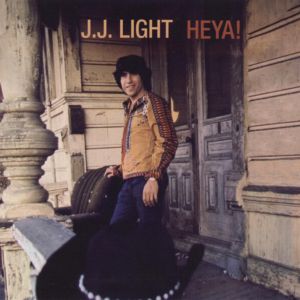
- Format: MP3

J.J. LIGHT was actually Jim 'James' Stallings, who played bass with the Sir Douglas Quintet from Mendocino onwards. The status of his 1969 LP, produced by Bob Markley of the WCPAEB, has always been a little murky, the main reason being that it was never released in the US. The title track, however, was a sizeable hit through much of Europe, South America and beyond and the LP was issued in several countries. As the title suggests, it has an American Indian theme - Jim was of Navajo descent - and like XIT and Jim Pepper's Witchi-Tai-To provides an interesting example of the much over-looked cross-over of this ethnic group into the musical mainstream.
Coming to LA from his native New Mexico at the start of the decade, Stallings recorded a doo-wop 45 for Paxley, the label legendary scenester Kim Fowley shared with Gary Paxton. Fowley introduced him to Bob Markley when the latter was playing bongos in a pizza restaurant. Bob would, of course, go on to be the controlling force in the WCPAEB, but in the meantime he and Jim came up with the concept for `JJ Light' through which Markley encouraged Stallings to connect with his Navajo routes. The result was the song Heya and the subsequent album.
The recordings involved many of the usual session crew - Jim Gordon, Early Palmer, Joe Osbourne and Larry Knechtel - but also lead guitarists Ron Morgan (from the WCPAEB) and Gary Rowles. The latter played on the last two LPs by Arthur Lee's LOVE, but he had also played with Stallings on a one-off Liberty 45 by the FORERUNNERS. (By an amazing coincidence he was also friendly with William Lincoln and Wesley Watt of EUPHORIA and even played guitar on the last track from their Capitol album - but I digress).
This CD, the first ever reissue of JJ Light's recordings, also includes 11 bonus tracks, most of which have never been released in any form. Recorded soon after the original sessions they come from acetates preserved by Stallings "on a dusty shelf". They have been fully remastered and sound great. One in particular, Low Riders Rule - with some crunching lead guitar - sounds a little like T Rex and also seems to be the blue print for a hit a decade later for War (the ubiquitous Low Rider, but don't be put off by the comparison). These tracks were arranged by Michael Lloyd - another WCPAEB connection.
As a final bonus there is the original UK single mix of Heya complete with over-dubbed vocals on the chorus.
Let yourselves be the judge, but I am glad at last to be able to say: LET THERE BE LIGHT!
JJ Light is better known as Jim Stallings, sometime bassist with the Sir Douglas Quintet. In the summer of 1969 Heya - a hypnotic song with a distinctive Native American flavour - took much of Europe by storm, reaching audiences as far afield as Japan, South America and New Zealand. Yet, despite being the work of an American living in Los Angeles and signed to a major US label, neither the 45 nor its attendant album would ever be released in America.
They make their long-awaited CD debut here, complete with copious bonus tracks including foreign B-sides and his long-lost, never-released second LP, also from 1969. Featuring contributions from members of the West Coast Pop Art Experimental Band, the Electric Prunes, Derek & The Dominos and Love, and assembled with Stallings close involvement, the package comes complete with detailed liner notes and many rare photos.
This one initially attracted my attention due to the fact Jim Stallings (aka J.J. Light) played bass on several classic Sir Douglas Quintet albums.
At some point in time Stallings became friendly with West Coast Pop Art Experimental Band front man/resident eccentric Bob Markley. The result was 1969's Markley-produced "Heya!". Credited to 'J.J. Light", the solo project's quite good. Light wrote all 14 (!) selections, showing a nice touch for balancing commercial moves with more experimental touches.
Anyhow, before going on any further, here's what the back cover liner notes say: "From the mold of 'early Dylan' comes this young, Navajo Indian - J.J. Light. His songs are unique and although they are not "message" songs, they show deep concern for the plight of his people and our society." Luckily the liner notes aren't exactly accurate.
There are a couple of nods to his Navajo heritage (the title track and 'Indian Disneyland'), but in spite the illusions to sappy singer/songwriter moves, exemplified by tracks such as the fuzz guitar propelled 'Follow Me Girl', 'It's Wednesday' and the echo-filled 'Gallup, New Mexico', Light's main interest is in rocking out. The opening rocker 'Na Ru Ka' bares an uncanny resemblance to something from Tjinder Singh and Cornershop (though it was penned some three decades earlier). Elsewhere, to my ears there's no Dylan comparison (good thing), rather Light occasionally recalls a young Arlo Guthrie, albeit with a rock-ish edge ('Silently Sleeping').
Features members of the "West Coast Pop Art Experimental Band", "The Electric Prunes" And "Love"